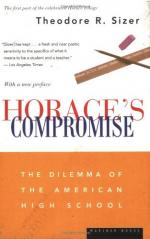|
This section contains 4,586 words (approx. 16 pages at 300 words per page) |

|
SOURCE: “Horace” in Latin Literature, Charles Scribner's Sons, 1908, pp. 106-19.
In the following essay, Mackail compares and contrasts Vergil and Horace, evaluates Horace's work, and explains how, with a mixture of luck, skill, and genius, Horace both perfected the Latin lyric and stopped its progress.
In that great turning-point of the world's history marked by the establishment of the Roman Empire, the position of Virgil is so unique because he looks almost equally forwards and backwards. His attitude towards his own age is that of one who was in it rather than of it. On the one hand is his intense feeling for antiquity, based on and reinforced by that immense antiquarian knowledge which made him so dear to commentators, and which renders some of his work so difficult to appreciate from our mere want of information; on the other, is that perpetual brooding over futurity which made...
|
This section contains 4,586 words (approx. 16 pages at 300 words per page) |

|


